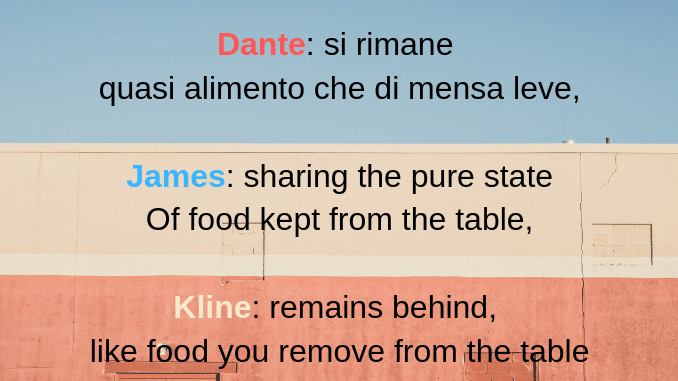
In yesterday’s blog post I wrote about Clive James translation of Dante’s Purgatory, Canto 25, lines 37-66. I contended that if you knew nothing about Galen’s medical theories then much of Clive James’ translation of Statius’ account of human generation would be incomprehensible. In contrast, A. S. Kline’s prose translation of the same passage CAN be understood without any prior knowledge of Galen.
Today I want to look at the first few lines of the passage in more detail to see why it is that James’ version is difficult to work out on its own merits.
First, here is the original:
Sangue perfetto, che poi non si beve
da l’assetate vene, e si rimane
quasi alimento che di mensa leve, 39prende nel core a tutte membra umane
Dante, Purgatorio 25, 37-41
virtute informativa…
And here is a plain translation of my own ![]() :
:
Perfect blood, which is not drunk by the thirsty veins, and which remains like food that’s removed from the table,
acquires in the heart the power to transmit it’s vitality to all parts of the human body…
Now here is Clive James’ version, beginning with a half-line and pattering out his favoured ABAB rhyme scheme:
The thirsty veins do not
Drink perfect blood, which, sharing the pure state
Of food kept from the table, takes in what
The heart confers, the power to generate
The future body’s parts.
Dante, Purgatory 25, 37-41 trans. Clive James
Rumbled By His Rhyme Scheme
Because of his rhyme scheme, Clive James finds it convenient to end the second line with “state” to set up the rhyme with “generate” two lines later. So as not to break the pentameter, he needs to pack the line with “sharing the pure…” which detracts from the clarity of the original, but also misconstrues the image.
The simile is not about “sharing the pure state” of the food at all, but about its not being consumed. Moreover, it is not “kept from the table” but “removed” from – or in one translation “left on” it. In other words, the food was there on the table, just as the “perfect blood” was there in the heart where it remains and yet is at the same time removed from – or at least not consumed by – the absorbing power of the veins. (That may be significant, but I am not sure at present whether the perfected and purified semen-bearing blood travels down to the organs of reproduction via the veins or arteries or by some other conveyance – i.e. the nervous system – in Avicenna’s system.)
Raised Up To A Higher Purpose
Dante’s simile is striking in that the remaining blood is compared to the removed food, so that what seems like a passive state is energised with a dynamic image of removal (assuming that “leve” is best translated as per Kline et al, as “remove[d]”), or, also implicit in the verb, of being “raised up” to a higher purpose, rather as the “pure blood” itself is “energised with an “informative virtue” for the higher purpose of bestowing “vitality” on the merely physical members that the lower, venous, blood generates in the body.
The Fidelity & Clarity of A. S. Kline’s Translation
amzn_assoc_tracking_id = “clevercuckoon-20”; amzn_assoc_ad_mode = “manual”; amzn_assoc_ad_type = “smart”; amzn_assoc_marketplace = “amazon”; amzn_assoc_region = “US”; amzn_assoc_design = “enhanced_links”; amzn_assoc_asins = “B00SIWHOWO”; amzn_assoc_placement = “adunit”; amzn_assoc_linkid = “5e25300c4764407231e4898a6b7d20e4”;As I mentioned before, A. S. Kline achieves a superb clarity by avoiding the Procrustean bed of rhyming verse translations and yet his translation is also taut and elegant, preserving the clarity of the original in a way that allows today’s reader to comprehend the meaning even if he has never heard of Galen or Aquinas:
Perfect blood, which is never absorbed by the thirsty veins, and remains behind, like food you remove from the table, acquires a power in the heart sufficient to invigorate all the members…
, Purgatory 25, 37-41 trans. A. S. Kline
DH
P. S. The next post on this topic is: A. S. Kline v Clive James: Virtue v Virtuosity
